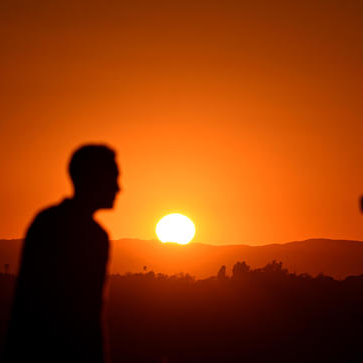Heat wave affects 31 million in California, Nevada, and Arizona

More than 31 million people in California, Nevada and Arizona were under an excessive heat warning issued by forecasters as temperatures soared Friday, according to the National Weather Service. In Southern California, the advisory is expected to last until Monday night after forecasters extended an earlier warning that was supposed to end Friday.
Residents of the region faced scorching temperatures well into the triple digits — from 119 degrees in Woodland Hills to 115 degrees in Riverside — as air quality regulators warned of unhealthy breathing conditions tied to the heat and some Los Angeles area schools ended classes early due to the weather and power outages. In Pasadena, rolling outages were issued after the extreme heat caused an equipment failure.
The excessive heat warning extends from the southernmost end of Central California all the way across Southern California to the U.S.-Mexico border. The National Weather Service has warned of "dangerously hot conditions." Other parts of California further north are under a less severe heat advisory that's also warning of warmer than usual weather.
Forecasters have issued a red flag warning in parts of LA, Ventura and Santa Barbara counties due to the risk of wildfires potentially sparking and spreading quickly due to especially dry, hot conditions — telling people in high-risk areas to be ready to evacuate. In San Bernardino County, a wildfire grew to more than 1,100 acres after starting the day before and triggering evacuation warnings.
People are being told to stay indoors, avoid physical activity and conserve energy due to the poor air quality. Health risks such as shortness of breath, wheezing and coughing are a concern as well as more serious health effects over the long run, according to the American Lung Association.
"Many areas in the United States produce enough ozone during the summer months to cause health problems that can be felt right away," the organization says. "Long-term ozone exposure is associated with increased respiratory illnesses, metabolic disorders, nervous system issues, reproductive issues... cancer and also increased cardiovascular mortality, which is the main driver of total mortality."
The bottom line: Take all necessary precautions, and be sure to use a MistBuddy personal mister if you're going to be outdoors to keep you cool, comfortable, and most importantly—safe.



